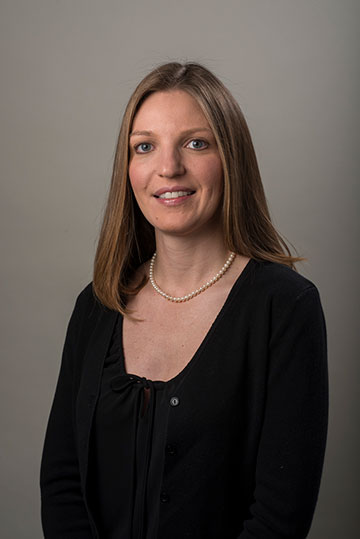
Jessica DeGroote Nelson
In this installment of Senior Member Insights, OPN talks with Jessica DeGroote Nelson. Jessica is the Director of Technology and Strategy at Optimax, a high-precision-optics manufacturer located in Ontario, NY, USA, as well as an adjunct faculty member at The Institute of Optics at the University of Rochester, where she teaches courses on optical fabrication and testing.
Jessica also actively presents and collaborates with The Optical Society (OSA), SPIE and the Optics and Electro Optics Standard Council (OEOSC). She is passionate about optics education, and she currently serves as the educational outreach chair for the OSA Rochester Section and chairs the SPIE Education Committee.
What first interested you in pursuing science?
When I was little, my grandfather taught me how to make a flashlight out of a battery, wire and a light bulb. Once I understood the circuit, we even included a switch and then made the case for it carved out of Styrofoam and fastened with duct tape, and I was hooked.
Time passed, influences change and when I was in high school, I thought I wanted to be a lawyer. Thank goodness my physics class in high school changed my mind back; I don’t think I could cut it as a lawyer! I absolutely loved that you could predict results using math and the laws of physics. I had always enjoyed math, but until I took physics I didn’t see the application. It was the combination of the two that reminded me that science was fun, and I wanted to turn it into a career.
What aspect of your current work do you find the most interesting or exciting?
The continuous evolution of freeforms is really exciting. New advances in fabrication methods in tandem with new metrology advances continue to push the state of the art to higher-precision freeform surfaces. Freeforms are enabling lighter-weight, more compact systems with additional degrees of freedom for designers. It is a neat time to be in the field of optical fabrication and testing.
What tips for successful networking do you have for early-career professionals?
I highly recommend getting involved in any opportunities that come your way, and attending as many talks and events as you can. Local and professional societies are always looking for enthusiastic volunteers—raise your hand and say “yes.”
What professional resources do you rely on to stay active and engaged with your field?
I am very involved in professional optical societies. Conferences are a fantastic way to stay engaged in the field. Technical talks keep me up to date on what is going on in the latest research, but it is during networking events that even more information is exchanged. I am very much looking forward to a time post-COVID-19 where we can all get together again for these information-exchange events.
What skills do you think are most important for someone interested in a career like yours?
Two of the most valuable skills I learned from my Ph.D. advisor in grad school were the ability to research new topics unfamiliar to me, and technical communication, especially technical presentations. Continuous-learning and technical-communication skills are critical in any technical field.
Describe a major turning point in your career. Was there a specific action/accomplishment that got you there?
A major turning point in my career was my decision to take advantage of the opportunity to get my MBA. My optics degrees provided me with an excellent foundation, but the MBA changed the way I think. I find it analogous to only seeing black or white, or right or wrong answers, while the world is full of colors and shades of gray.
The executive MBA program opened my eyes to different perspectives that allow me to appreciate many points of view in business, technology, professional relationships and strategic development.
What is one piece of advice that you wish you were given as a student/early in your career?
It is okay not to have all the answers about “what you want to be when you grow up.” The only thing that is absolutely necessary is to have a goal and work as hard as you can toward it. You will achieve goals, and it is important to have the next on deck!
What have you learned by being a mentor to others, and what have you learned from mentors who helped shepherd your career?
It is important to be true to your own values and make sure to set a good example, even if you don’t think someone is watching. I look up to, and have been mentored by, many people who probably don’t know they have been my mentor. Mentoring can take on many forms, and can be as simple as an encouraging word or praise to someone new in their career. Every moment counts.
What habits do you frequently rely on that help you to succeed?
I am successful in my career because of the support from my family. I have a wonderful husband who encourages me and is supportive of business trips and occasional late nights or early mornings to meet deadlines. I also have the support of my parents who watch my daughter every day while my husband and I are both working and help pick up the slack when I run out of hours in the day. I am positive I would not be able to do everything I do if it weren’t for my husband and my parents.
If you weren’t in the sciences, what would be your dream career?
If you had asked me a few years ago, my answer might be different, but today if I weren’t in the sciences I would want to be a stay-at-home mom with my daughter Amelia. She just turned four, so all of the parents of teenagers out there will probably tell me my answer will change again in a couple years!
